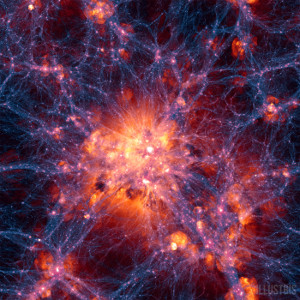 |
|
Image: Snapshot image from the Illustris simulation, the currently largest and most sophisticated numerical model of galaxy formation.
Copyright: Illustris Collaboration (CfA, MIT, HITS, Heidelberg University, IoA, STScI)
|
|  |
This summer, the MPA has invited Volker Springel to continue the well-established series of Biermann lectures. Prof. Springel is currently professor for Theoretical Astrophysics at Heidelberg University and leads a research group dedicated to numerical simulations of galaxy formation at the Heidelberg Institute for Theoretical Studies (HITS). He is perhaps best known for the GADGET code he authored, which allowed him to carry out the Millennium and Aquarius simulations, two landmark projects of the international Virgo Consortium. More recently, he developed a novel moving-mesh technique for cosmological hydrodynamics, which produced the largest and most sophisticated numerical model of galaxy formation on cosmological scales thus far, the "Illustris" simulation. This work promises new insights into the complex process of galaxy formation and facilitates important predictions for the impact of baryonic physics on the overall mass distribution.
Volker Springel has made important contributions to the physical modelling of feedback from star formation and accreting supermassive black holes. His new AREPO code aims to be equally useful as GADGET for the field. He is also well known for the iconic images of cosmic large scale structure he made from the Millennium simulation, which have been a source of inspiration for professional astronomers and the public alike. Volker Springel has received a number of awards, among them the the Klung-Wilhelmy-Weberbank Prize for Physics in 2009, the Heinz-Maier-Leibnitz Prize of the DFG in 2004, and the Otto-Hahn-Medal of the MPG in 2001.
Biermann Lectures 2014 by Volker Springel (HITS, Heidelberg)
Titel: Astrophysical research with computer simulations
Wednesday, June 11: Promises and perils of scientific simulation
Wednesday, June 18: Hydrodynamical simulations of galaxy formation
Wednesday, July 2: The feedback conundrum: What physics regulates galaxy and star formation?
|